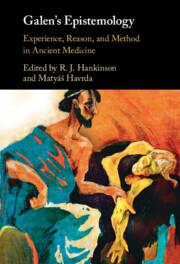Book contents
- Galen’s Epistemology
- Galen’s Epistemology
- Copyright page
- Contents
- Abbreviations
- Introduction
- Chapter 1 ‘Do I Wake or Sleep?’
- Chapter 2 Galen’s Empiricist Background
- Chapter 3 Discovery, Method, and Justification
- Chapter 4 From Problems to Demonstrations
- Chapter 5 Galen’s Notion of Dialectic
- Chapter 6 The Relationship between Perceptual Experience and Logos
- Chapter 7 Galen against Archigenes on the Pulse and What It Teaches Us about Galen’s Method of Diairesis
- Chapter 8 On Sense-Perception
- Chapter 9 Reason and Experience in Galen’s Moral Epistemology
- Chapter 10 The Arabic Alexandrians’ Summary of Galen’s On the Therapeutic Method
- Chapter 11 What Level of Certainty Can Medical Sign-Inference Reach?
- Bibliography
- Index of Passages
- General Subject Index
Chapter 11 - What Level of Certainty Can Medical Sign-Inference Reach?
A Discussion of Galen’s Demonstrative Method in the Islamic World
Published online by Cambridge University Press: 04 May 2022
- Galen’s Epistemology
- Galen’s Epistemology
- Copyright page
- Contents
- Abbreviations
- Introduction
- Chapter 1 ‘Do I Wake or Sleep?’
- Chapter 2 Galen’s Empiricist Background
- Chapter 3 Discovery, Method, and Justification
- Chapter 4 From Problems to Demonstrations
- Chapter 5 Galen’s Notion of Dialectic
- Chapter 6 The Relationship between Perceptual Experience and Logos
- Chapter 7 Galen against Archigenes on the Pulse and What It Teaches Us about Galen’s Method of Diairesis
- Chapter 8 On Sense-Perception
- Chapter 9 Reason and Experience in Galen’s Moral Epistemology
- Chapter 10 The Arabic Alexandrians’ Summary of Galen’s On the Therapeutic Method
- Chapter 11 What Level of Certainty Can Medical Sign-Inference Reach?
- Bibliography
- Index of Passages
- General Subject Index
Summary
This chapter examines the change in the fortunes of Galen that began to occur at the time when Aristotle was beginning to be recognised as the supreme ancient authority in the Arabic world, eventually eclipsing the reputation of Galen, at least as a philosopher. It shows how Galen’s pre-eminence as a philosophical authority was gradually undermined by a sequence of commentators on his great work of scientific method, On Demonstration. Its main focus is on al-Rāzī’s Doubts about Galen composed in order to bolster Galen’s reputation when it was beginning to be challenged, notably by al-Fārābī. Central to al-Rāzī’s (partial) defence is an endorsement of Galen’s strong, Aristotelian notion of a demonstrative empirical science, as well as of his rejection of mere induction and argument from example as appropriate means of arriving at the requisite axiomatic principles. However, al-Rāzī takes Galen to task for failing to observe his own distinctions, and for taking insufficient care to ground his own fundamental assumptions. Al-Rāzī then applies his modified Galenian method to theological arguments, notably design-arguments, and in order to reject supposedly fallacious materialists’ arguments against creation. The article then turns to al-Fārābī, who in contrast directly attacks Galen’s inferential methods to support contrary, Aristotelian, positions.
- Type
- Chapter
- Information
- Galen's EpistemologyExperience, Reason, and Method in Ancient Medicine, pp. 275 - 289Publisher: Cambridge University PressPrint publication year: 2022

